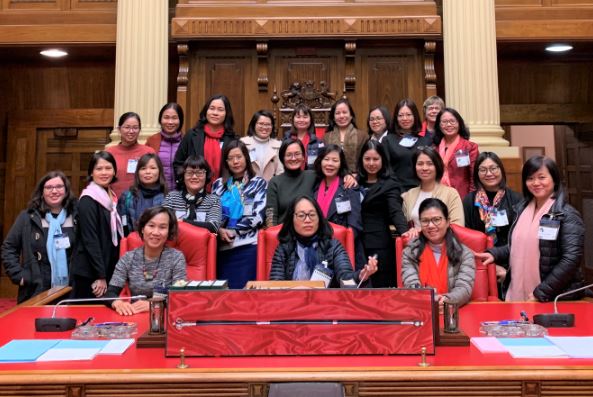
Two graduates of the Department of Foreign Affairs and Trade (DFAT) Government Partnerships for Development-funded human resource development project, Nguyen Thanh Cam and Hoa Nguyen Thi Mai, have been elected to the Vietnam National Assembly.
Administered by the Flinders University College of Humanities, Arts and Social Sciences, the Gender Consortium works extensively to foster gender equity and women’s leadership programs throughout South-East Asia and the Pacific.
“They are a part of a good news story about the recent national elections in Vietnam,” says Flinders University Gender Consortium director Cara Ellickson, who says the project has been instrumental in producing key alumnae and collaborators to combat domestic violence and human trafficking in Vietnam (2014-2017).
“Women in Vietnam won over 30% of the seats which is just shy of their highest level of female representation since the 1970s,” she says. “This is a fabulous achievement by the women of Vietnam, with the 2021 world average for female parliamentarians around 25.5%.
“Our Australian and Vietnamese team members are passionate about offering this support. We need more women leaders at national levels but we especially need women leaders who understand how gender inequalities drive gender-based violence and how domestic violence and other forms of violence against women are a significant barrier to women’s leadership at all levels.”
The project was founded on collaborative applied research led by Gender Consortium associate, Dr Anuradha Mundkur, in partnership with Nguyen Thanh Cam, who at the time headed up the law and policy department for the Vietnam Women’s Union (VWU). The research identified and mapped domestic violence and human trafficking service and policy gaps in Vietnam.
The Gender Consortium worked closely with local partners including the Centre for Women and Development – VWU – project results included approval for a new women’s Peace House shelter, one of only three women’s shelters in Vietnam to be funded under the Government of Vietnam’s national budget.
The collaboration also started two new social enterprises to support the Peace House Shelters, developed a new Undergraduate University Course on gender-based violence by the Vietnam Women’s Academy, and been involved in publishing Gender Based Violence Training Manuals for training courses across Vietnam. Upgraded database systems and new risk assessment tools and safety planning processes have been helping domestic violence and trafficking victims through the Peace House National Hotline.
Now in its fourth year, the Gender Consortium’s current work in Vietnam, is the DFAT-funded Aus4Skills ‘Women and Leadership Journey’ (WIL-J), being implemented in partnership with the Ho Chi Minh National Academy of Political Science’s Vietnam Centre for Gender Studies and Women’s Leadership (GeLEAD).
“The WIL-J has been driving change in gender equitable leadership in Vietnam and has been appraised in highly positive terms by stakeholders, and regarded as a transformative experience for participants, both professionally and personally.
“The action research application projects implemented after training and field work inputs in both Vietnam and Australia have also been highly appraised as they have included many system level changes, such as the introduction of anti-sexual harassment policies, instalment of women leaders on boards for the first time and the introduction of special measures in private sector funding to close the gaps in enterprise support for women,” Ms Ellickson says.

